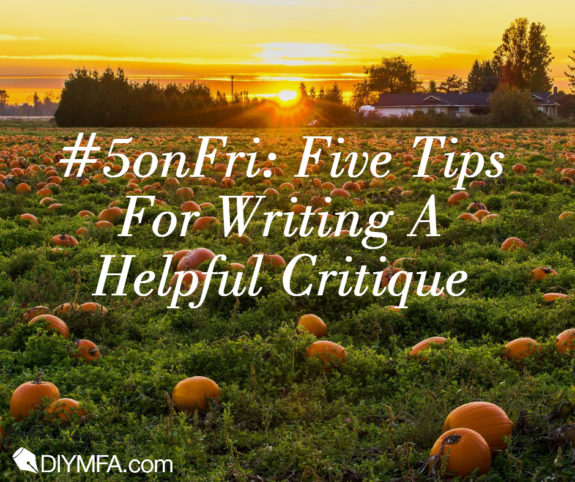“Critique days” were met with both anxiety and excitement in my undergraduate creative writing courses. The whole class would sit in a circle and, one-by-one, we would each have our writing critiqued by both our peers and our instructors. Talk about nerve wracking. Sometimes the feedback would be helpful and encouraging. Other times, I would leave the classroom feeling hurt and frustrated.
Not only can critiques be difficult to receive, but they can also be extremely difficult to give. How do you even begin to write a constructive critique? Never fear. Below, I have provided five simple tips for giving a helpful and informed critique (that won’t result in you getting a death glare from across the room).
Please note that, in this article, I am primarily focusing on how to critique short stories, however, these tips can also be modified and applied to longer pieces, in addition to non-fiction pieces.
1) Keep a cheat sheet
For every story I critique, I create a “cheat sheet” that helps keep me focused as I read. On my sheet, I keep track of the following:
- Genre
- What’s at stake throughout the story
- Point of view
- What the narrator wants
- Themes
- Inciting incident/hook
- What pushes the story forward
I keep each of the above elements in mind as I write my critique and focus on how they all work together. Are some elements missing? Are there clear stakes that push the story forward? Is the point of view unclear? All of these things are important to note and are immensely helpful to reference when giving a writer feedback on their work.
2) Read the story at least twice
While it’s true that many editors won’t read a story more than once when trying to make a publication decision (sometimes, they might only read the first page), as a critiquer, you should be reading a story at least twice.
It’s almost impossible to pick up on all the different elements and details of a story in just one reading, which is why it’s important to read it multiple times and take notes as you read.
What happens if you don’t take the time to thoroughly and completely read a story? I’m going to be honest, here: one time, I skimmed a person’s story only once before providing a critique. I got the character’s names wrong and completely confused some plot points in my feedback. Cringe!
I can’t emphasize enough how important it is to take your time when reviewing another person’s work. Not only will they appreciate your thoughtful and informed feedback, but you will also improve your own writing and reading skills by thinking deeply and critically about every piece that you critique.
3) Don’t only focus on the bad elements
It can be easy to get caught up in the faults of a story. Maybe the characters fall flat. Maybe the dialogue makes you yawn. Maybe the whole thing gives you a stress induced eye twitch. Whatever faults a story might have, it’s important to mention them, however, it’s also important to remember that writers are people, too.
Think of it like this: let’s say you’ve spent hours perfecting a short story. You’ve agonized over the characters, pulled your hair out over word choices, and are brave enough to show it to the world for feedback. Would you feel encouraged by an impersonal laundry list of all the things wrong with your story? Of course not!
That’s why, with every fault that I find in a story, I make it my job to find at least one thing that was done extremely well. Some people are very good at world building, or crafting gorgeous descriptions, so I make sure to mention those things in my critique. Other people write dialogue that leaps off the page, so I make sure to talk about that in the critique as well.
Simply put, critiques aren’t just for talking about all the things wrong with a story. There should also be some time spent discussing everything that was done well.
4) Provide detailed examples
“Your main character annoyed me.”
The above comment is actual feedback I received on one of my first short stories. Not very helpful, right? The comment is vague and doesn’t give me any actionable steps to improve my writing. Instead, it leaves me feeling frustrated and a little bit angry.
So, how can you avoid frustrating and/or angering your critique partners? Simple: be as detailed as possible.
Vagueness is not your friend when you’re trying to give a thoughtful critique. It’s important to be as specific and detailed as possible when you are making suggestions for improvements.
For example, if a story shifts point of view halfway through, don’t say something like “I was confused halfway through the story.” Instead, say something along the lines of: “The POV shift on Page 5 took me out of the story. In order to create consistency, I would keep the POV consistent throughout the whole story, or add a clear section break to signify a definite change in POV.”
Providing such detailed examples gives the writer actionable steps to take in order to improve their work. Now, this doesn’t mean that they have to make every change that you suggest, however, it gives them something to think about and allows them to view their work from a different perspective.
5) Keep the big picture in mind
This is where your handy “cheat sheet” from Tip #1 comes into play.
When critiquing a story, I always try to keep the “big picture” elements in mind. For example, what are the major themes in the story I am reading? What is the writer trying to get across?
As I start to see recurring themes or symbols in a piece, I always make sure to note them on my cheat sheet. At the end of the critique, I will bring them to the author’s attention. Maybe the symbolism was intentional, or maybe the author had no idea that they were exploring a certain theme.
A “big picture” look at a story can be very helpful for writers, especially if they’ve been working on a particular piece for a long time. Sometimes, it’s easy to get caught up in the smaller details of a story and a broader analysis of themes and symbols can oftentimes point writers in directions that they’ve never considered before, or maybe even inspire future stories.
Have you ever received an awesome critique? What are some strategies that you utilize when critiquing someone’s work? Let me know in the comments!
 Manuela Williams is a Las Vegas-based writer and editor. She is the author of Ghost In Girl Costume, which won the 2017 Hard To Swallow Chapbook Contest. When she’s not writing, Manuela is busy drinking coffee and spending time with her blind Pomeranian, Redford. You can connect with her on LinkedIn and Pinterest.
Manuela Williams is a Las Vegas-based writer and editor. She is the author of Ghost In Girl Costume, which won the 2017 Hard To Swallow Chapbook Contest. When she’s not writing, Manuela is busy drinking coffee and spending time with her blind Pomeranian, Redford. You can connect with her on LinkedIn and Pinterest.







